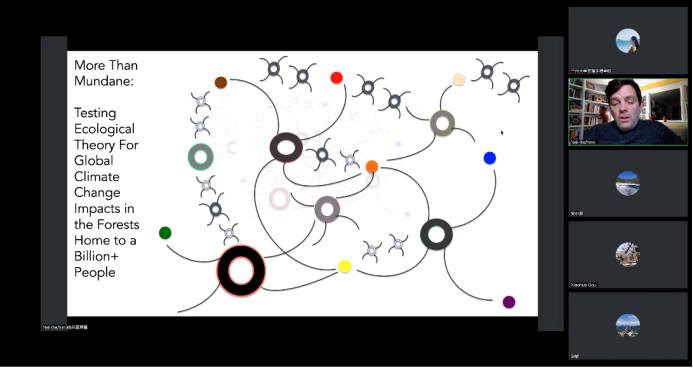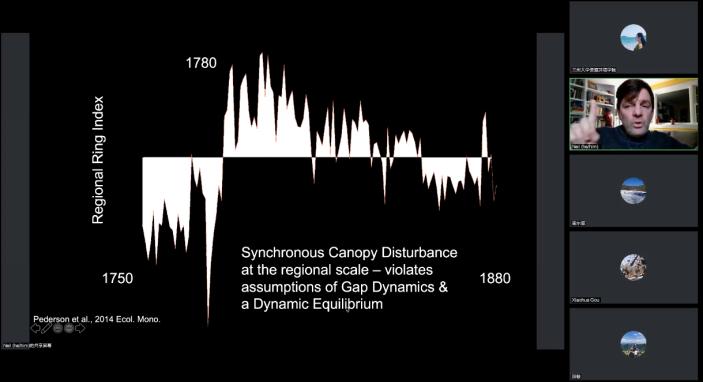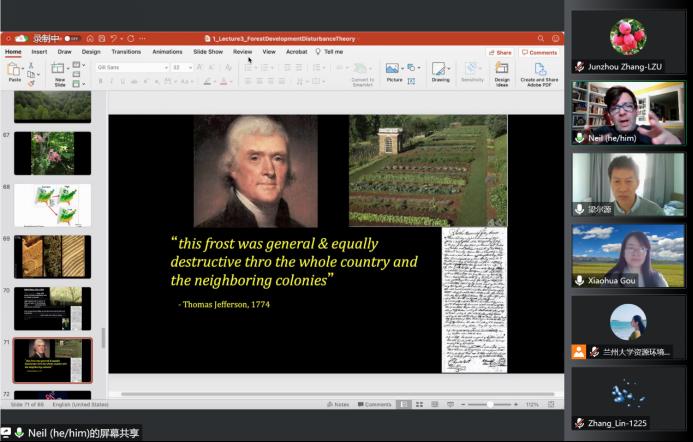On 5 December 2022, at the invitation of Professor Gou Xiaohua and Young Researcher Zhang Junzhou from the Key Laboratory of Western Environment Ministry of Education, College of Earth and Environmental Sciences, Lanzhou University, Neil Pederson, a researcher at the Harvard Forest Research Center, gave the third online lecture entitled "More Than Mundane: Testing the Ecological Theory for Global Climate Change Impacts in the Forests Home to a Billion+ People" to our students and faculty. The presentation was hosted by Professor Gou Xiaohua. The lecture was hosted by Prof. Gou Xiaohua and was conducted through an online meeting with about 200 faculty members, undergraduate students, and postgraduate students from Lanzhou University and related universities and research institutes.

Eighty percent of current tree-rotation-based research has focused on conifers, and very little has been done on the rich diversity of broadleaf tree species. Based on this, Neil Pederson focuses on Temperate Mesic Forests (TMMFs), which are inhabited by or adjacent to more than 1billionpeople, and introduces the progress of forest disturbance and regeneration using tree annual rings to provide an important basis for the conservation and management of TMMFs in the context of climate change.First, by presenting the impact of current frequent droughts, pests, and fires on forests, researcher Neil Pederson illustrates that climate change significantly affects forest ecosystems, while studies on the life history scale of trees are still lacking, and there is still a large uncertainty of how forests will change in the future. Next, Neil Pederson presented the Gap Dynamics Theory and Dynamic Equilibrium Theory, noting that evidence from three studies did not support these theories: (1) A large area tree wheel reconstruction study of forest change history found that different tree species in different areas grew synchronously after disturbance; (2) Reconstruction of fire history based on fire scars, and study of past tree renewal based on old trees of buildings both found that most tree renewals occurred on a 30-40 year cycle; (3) Analysis of a large number of old tree discs collected in the early part of the last century found that most tree renewals occurred at the same time as the currently collected trees. Thus, the renewal of these forests may also be related to climate change. Finally, researcher Neil Pederson presented a study of the dynamics of temperate forest change currently underway in the northeastern United States to explore the major causes of forest turnover and evolution.


After the presentation was completed, there were active questions and discussions among the participating students and faculty, and researcher Neil Pederson gave serious and comprehensive answers to a number of questions.
Expert Profile:
Neil Pederson is a senior ecologist and researcher at the Harvard Forest Research Center at Harvard University (USA), where he focuses on the response of tree growth and forest dynamics to climate and its mechanisms. He has been a key player in international research on tree rotation ecology, especially in the study of temperate broadleaf mixed forest disturbance, where his insights are unique and widely influential. He has made important progress in the study of temperate tree-wheel climatology, especially in the breakthrough of the past climate change pattern in Mongolia and its impact on forest communities. He has made much research in the fields of natural history, giant flora, old forests, and tree characteristics. He has published more than 120 papers with over 3000 citations in international journals such as PNAS, Global Change Biology, Ecological Monographs, Journal of Climate, Agricultural and Forest Meteorology, etc. Neil Pederson is one of the frontier reviewers of the US Natural Science Foundation and has received the Sigma Xi National Scientific Research Society Award.